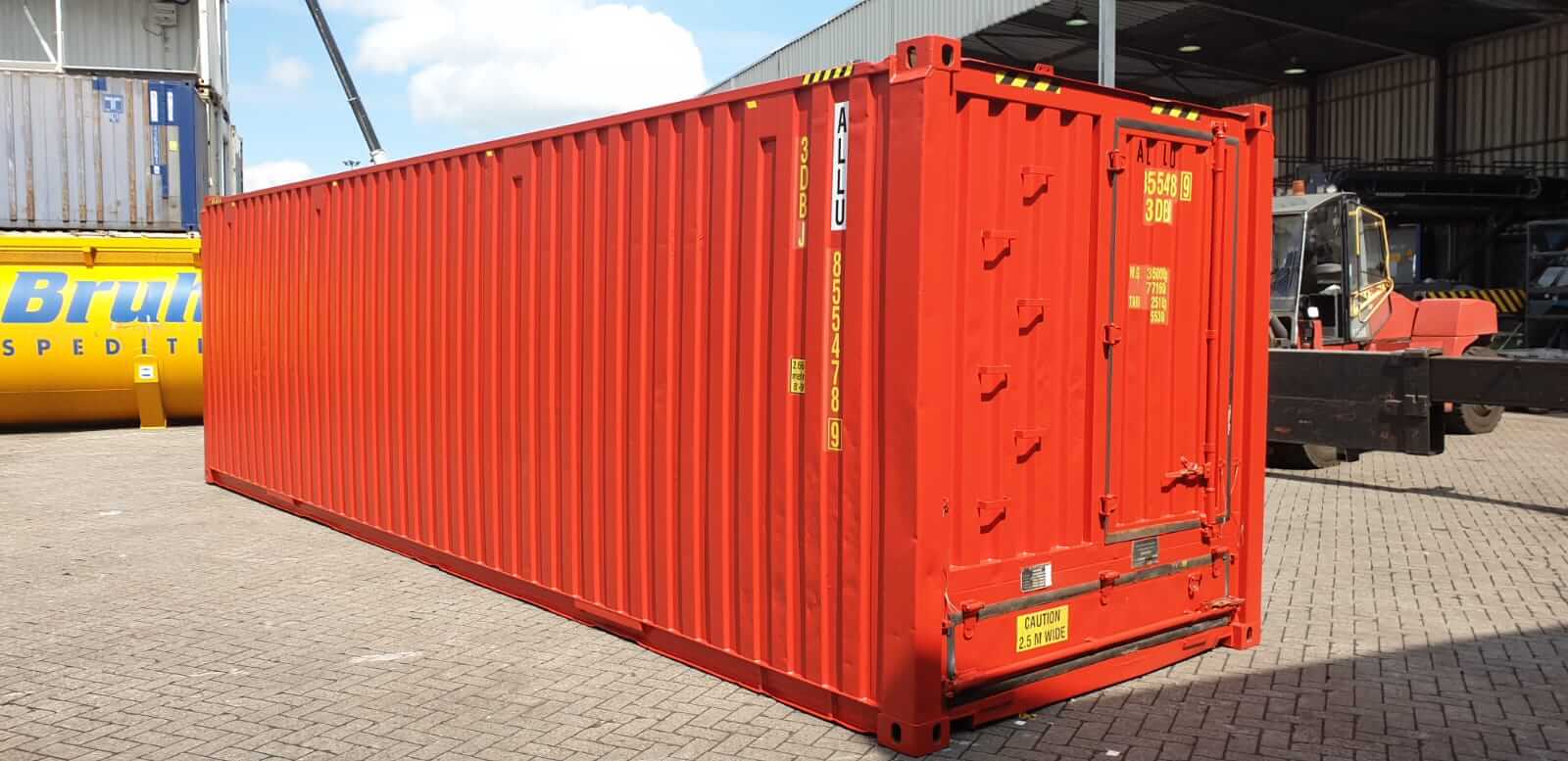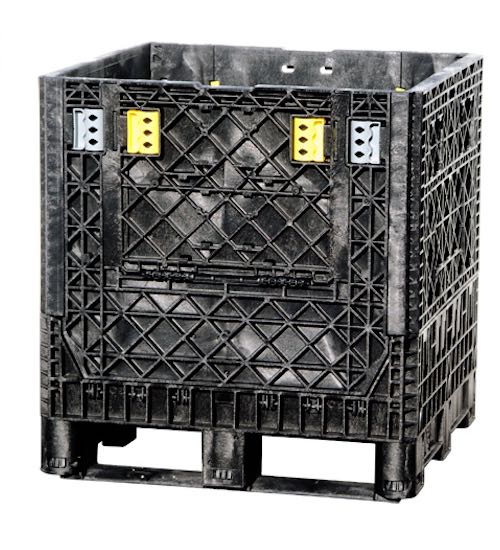The Ultimate Guide to Picking the Right Bulk Containers for Your Organization Demands
Picking the ideal mass containers is vital for any type of organization that counts on efficient logistics. Different kinds of containers exist, each created for particular materials and applications. Aspects such as dimension, product compatibility, and regulative standards play a significant duty in this decision-making procedure. Comprehending these elements can result in enhanced operational efficiency. Several organizations forget important facets that might enhance their overall effectiveness and sustainability. What are these factors to consider?
Recognizing Various Sorts Of Bulk Containers
Mass containers serve as important devices for companies looking for efficient storage and transport solutions. These containers are available in numerous kinds, each created to meet particular operational demands. One usual type is the intermediate bulk container (IBC), which is ideal for liquid and granulated materials, supplying a balance of capability and ability to move. An additional preferred option is the mass bag, or FIBC, appropriate for completely dry, flowable products. These versatile containers are light-weight and can be quickly moved and kept. For much heavier materials, stiff bulk containers are often utilized, offering durability and stability for safe handling. Additionally, there are customized containers tailored for unsafe materials, making certain conformity with security regulations. Understanding the distinct characteristics of these bulk container kinds enables organizations to make informed decisions that optimize logistics and decrease prices. By choosing the appropriate container, business can improve their operational performance and streamline their supply chain procedures.
Secret Product Factors To Consider for Mass Containers
When choosing mass containers, it is important to contemplate the materials utilized in their construction. Elements such as chemical, resilience, and strength compatibility play a vital function in making certain the containers satisfy specific operational demands. In addition, weight and portability concerns can influence both efficiency and transportation logistics.
Product Longevity and Toughness
Toughness and stamina are important consider choosing products for bulk containers, as they directly affect the container's capacity to endure various environmental conditions and dealing with processes. Products such as high-density polyethylene (HDPE), polypropylene, and stainless steel are generally preferred for their durable homes, supplying resistance to impact, temperature level, and abrasion changes. The selection of material likewise impacts the overall life expectancy of the container; stronger products commonly lead to less regular replacements, leading to cost savings with time. Furthermore, the weight of the product can affect shipping prices and ease of handling. Services have to consider their particular functional atmospheres and the possibility for wear and tear to ensure peak toughness and toughness in their bulk container selection.
Chemical Compatibility Variables
Understanding chemical compatibility is necessary for picking bulk containers, as the materials used should stand up to the certain compounds they will certainly hold. Different variables influence compatibility, including the chemical nature of the contents, temperature, and duration of storage. Harsh chemicals might require containers made from stainless steel or specialized plastics that resist degradation. Furthermore, responsive materials can produce heat or gases, necessitating vented or pressure-rated containers. The choice of container product, whether polyethylene, polycarbonate, or steel, need to line up with the chemical homes of the stored materials to stop leakages or breaches. Ultimately, a comprehensive examination of these compatibility variables guarantees safe handling and storage, shielding both employees and the environment while preserving product stability.
Weight and Mobility Worries
Selecting mass containers involves not just examining chemical compatibility but also considering weight and portability. Businesses need to examine the convenience of handling and transportation to enhance efficiency. Lightweight products like high-density polyethylene (HDPE) or aluminum can assist in less complicated movement and lower shipping prices. Conversely, heavier containers may give enhanced sturdiness however can impede mobility, particularly in atmospheres calling for regular moving. Additionally, the style of the container should permit practical training and piling, ensuring ergonomic safety for employees. Business must likewise consider the facilities offered for transport; as an example, containers compatible with forklifts or pallet jacks can enhance operations. Eventually, the ideal balance between weight and mobility straight affects functional efficiency and expense performance.
Sizing Your Mass Containers for Optimum Efficiency
When sizing mass containers, organizations must thoroughly examine the dimensions called for to suit their certain items. In addition, weight ability is a crucial element that affects performance and safety and security during transportation and storage. Reliable sizing not just makes the most of space yet likewise maximizes operational process.
Determining Container Dimensions
Choosing the appropriate dimensions for bulk containers is vital for optimizing efficiency in storage space and transport. Companies have to analyze their particular needs, considering factors such as available room, the nature of the goods being stored, and the techniques of transportation used. Precise measurements ensure that containers fit ideally in storehouses and cars, minimizing squandered space and reducing dealing with time. Criterion sizes can provide ease, yet custom-made measurements may be needed for unique requirements or to accommodate specific products. In addition, it is necessary to evaluate stacking capacities and availability, as these variables influence overall operational performance. Ultimately, the right measurements result in improved company and streamlined logistics, benefiting the overall efficiency of business.
Weight Capability Considerations
Understanding weight capacity is essential for services intending to enhance their bulk container performance. The weight capacity of a container directly impacts storage capacities, transportation logistics, and overall operational expenses. Picking containers with the appropriate weight limitations ensures that companies can securely keep and transport their goods without running the risk of damage or compliance concerns. Straining containers can result in architectural failures, while underutilizing ability results in wasted resources. When choosing containers, it is important about his for businesses to assess their item weights and take into consideration any kind of regulatory needs. In addition, variables such as the type of product, meant use, and environmental conditions must also affect weight capacity decisions. By evaluating these elements, companies can enhance performance and ensure a streamlined supply chain.
Governing Conformity and Security Standards

Regulatory conformity and security criteria play a vital duty in the option of bulk containers for companies. Organizations has to assure that their containers fulfill various guidelines set by regional, nationwide, and global authorities. These standards frequently concern product safety, architectural stability, and appropriate labeling, which assist stop mishaps and ensure the secure transport of items.
In addition, adherence to industry-specific guidelines, such as those from the Fda (FDA) or the Occupational Security and Health And Wellness Management (OSHA), is crucial for firms taking care of harmful products or food. Non-compliance can lead to fines, lawful concerns, or damage to a business's track record.
Businesses should additionally think about the container's compatibility with the products being stored or transferred to avoid contamination or chemical reactions (refurbished bulk containers). To summarize, comprehending and carrying out governing conformity and safety standards is necessary for the efficient and liable use bulk containers
Sustainability Alternatives for Eco-Friendly Bulk Containers

Companies are also checking out alternatives made from recycled products, which not just save sources however likewise support the reusing industry. Moreover, advancements in layout permit for lighter containers that need less energy to transportation, better boosting sustainability. By incorporating these green mass container alternatives, services can demonstrate their dedication to ecological stewardship while meeting customer need for lasting practices. This change not just assists the Full Article world however can likewise enhance brand name online reputation and customer commitment.
Cost-Effectiveness and Budgeting for Bulk Containers
While numerous organizations concentrate on sustainability, cost-effectiveness continues to be a critical element when picking mass containers. Organizations should examine the initial acquisition rate, along with long-lasting functional expenses, to ensure financial stability. Factors such as upkeep, resilience, and reusability play a substantial duty in determining overall expenses.
Buying top quality containers might produce greater ahead of time costs however can cause cost savings with reduced substitute rates and reduced waste. In addition, services should think about transport expenses and storage effectiveness, as these can influence the overall budget.

Regularly Asked Questions
Just how Do I Identify the Right Container for Hazardous Materials?
To figure out the right container for hazardous materials, one should evaluate compatibility with the material, take into consideration the container's material, look for regulatory conformity, and evaluate capability and safety and security features to assure proper handling and storage.
Can Mass Containers Be Custom-made for Certain Products?
Yes, bulk containers can be customized for particular products. used bulk containers. Various features, such as style, size, and material, can be customized to fulfill special his comment is here needs, guaranteeing optimal security and performance for delivering and saving different products
What Is the Typical Life Expectancy of Different Mass Container Kind?
The typical lifespan of mass container kinds varies; plastic containers last 5-10 years, metal containers 10-20 years, and wood containers typically last 3-7 years, relying on usage, upkeep, and ecological problems.
Just how Should I Clean and Maintain Bulk Containers?
To clean up and keep bulk containers, one need to consistently examine for damages, remove residue, wash with ideal cleaning agents, rinse extensively, and assurance correct drying before storage space. Adhering to supplier standards improves longevity and safety throughout use.
Are There Rental Options for Mass Containers Available?
Yes, various business use rental options for mass containers, giving adaptability for services. These services can accommodate numerous needs, permitting business to handle stock efficiently without the dedication of buying containers outright.
Resilience and stamina are vital aspects in selecting materials for bulk containers, as they straight influence the container's ability to stand up to numerous ecological conditions and handling processes. Recognizing chemical compatibility is necessary for choosing mass containers, as the products utilized must withstand the certain substances they will hold. Comprehending weight ability is vital for companies intending to enhance their bulk container effectiveness. Regulatory conformity and safety standards play a necessary role in the selection of mass containers for services. While many businesses focus on sustainability, cost-effectiveness continues to be an important variable when selecting bulk containers.